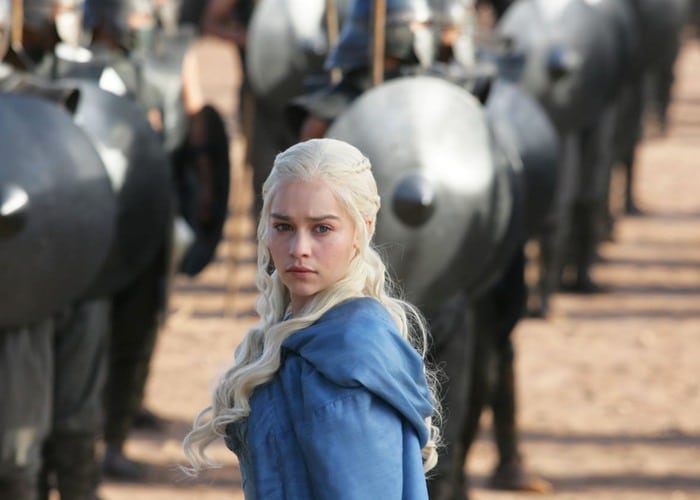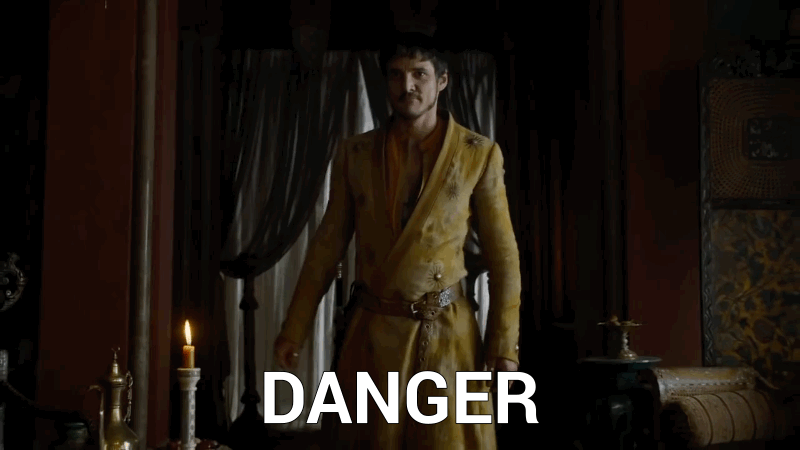
Are we on our way toward The Mad Queen?
Throughout season 6 of Game of Thrones, I’ll be using a column later in the week to explore some of the bigger questions that come out of the weekly recording of A Storm of Spoilers, the podcast upon which I muse about Thrones alongside Geek.com’s Dave Gonzales and Vanity Fair’s Joanna Robinson. By this point in the week, I always feel as if a bigger question has emerged from every episode, especially now that we’re moving well-past the adaptation of George R.R. Martin’s A Song of Ice and Fire novels.
This week’s big question: Who is the ultimate villain of this story of Ice and Fire?
First a spoiler warning: what follows includes the show up through the most recent episode, book knowledge, crackpot theories, and speculation. We will take our theories with Fire and Blood.

The question we must first ask before we can point a finger at a villain is whether or not there will be an ultimate villain in this story in the first place. It’s possible that this Song of Ice and Fire is about balancing the natural order of things. The magic behind the rise of the White Walkers and the magic behind the rebirth of the dragons could be two sides of the same supernatural coin. Their war, waged again and again through the ages, could be like the great flood of the Bible: a cleansing fire to wipe out a wayward humanity, with Bran Stark creating a mystical Noah’s Ark forcefield to protect the members of society who will start again.
One of George R.R. Martin’s favorite things to do is the subversion of our expectations. Those expectations, like many of the details of his tale, come from both fantasy stories we’ve seen before and human history. Eschewing the classic good vs. evil story would be one way of continuing to subvert expectations, but for the sake of this discussion, let’s assume that George is going to give us some semblance of a hero and a villain.
The Obvious Choice
Since his introduction in season four, the safest assumption would be to place the villain crown on the already thorny head of The Night’s King. He’s been turning babies into ice zombies, leading an army of the dead on a slow march toward the wall, and giving our beloved Jon Snow the frozen stink-eye for a few seasons. In the trailer for season 6, we see that he’s moved on to becoming Westerosi Freddy Krueger, haunting Bran’s visions. He’s even got four lieutenants on horseback, another Biblical call back if there ever was one.
The most commonly held theory is that Jon Snow —whose lineage is likely a mix of Stark and Targaryen – will eventually ally himself with his aunt Daenerys in a fight on the side of Fire. Alongside a third dragonrider (perhaps with a custom saddle for the vertically challenged), they will use dragonfire to take down the army of The Icey Dead. Because after all, Jon’s sword Longclaw is among the few weapons in the known world that will kill a White Walker: it’s Valyrian steel, also known as dragon steel. Dragon steel, dragon glass, and yes, dragon fire.
It’s the simple theory: Ice and Fire are the two sides, clearly one of them has to be the heroic side, right?
Maybe.
The Mad Choice
One of the theories that emerged from this week’s episode (and the discussion on A Storm of Spoilers, including a reader email that kicked off my descent into madness): what if Daenerys Targaryen is really the story’s big bad, or at least one element of villainy?
We like Dany. She’s risen from being sold off by her own brother to being the person in the story with the longest title: Daenerys Stormborn of House Targaryen, First of Her Name, Queen of Meereen, Queen of the Andals, the Rhoynar, and the First Men, Lady Regnant of the Seven Kingdoms, Protector of the Realm, Khaleesi of the Great Grass Sea, Breaker of Chains, The Unburnt, Mother of Dragons.
Aside from a title that sounds like her startup just got way over-funded, Dany has always been a sympathetic (and often times triumphant) character for the audience. We’ve gladly followed her on her path toward taking back what is hers by birthright, the inheritance that is the one true ruler of Westeros.
But have we stopped to consider what kind of legacy she’s inheriting? We’re talking about the Targaryen Dynasty, which began with Aegon the Conquerer. He lead his people out of the Doom of Valyria alongside his two dragon-riding sisters. From the ashes of a civilization in the East (which sounds a lot like what’s about to happen in Slaver’s Bay), Aegon and his sisters went to Westeros and slaughtered the denizens of the Seven Kingdoms. It is said that Aegon had been torn, during the “Bleeding Years” directly following the Doom, between conquering Westeros or uniting the Free Cities. He chose Westeros and took what he wanted with Fire and Blood. As much as we (and the storytellers within the show and books) romanticize the Targaryen Dynasty – the Conquest, the Dance of Dragons, etc. – the fact that the Targaryens invaded Westeros and seized power by force should not be overlooked.
In more recent history, let’s not forget about Daenerys’ father, The Mad King Aerys. The most memorable thing about him is how he earned his moniker, by going insane and dumping wildfire on Ned Stark’s father and brother, among other things. What is often overlooked is that he wasn’t always The Mad King. The Wiki of Ice and Fire provides a good summary:
Aerys showed great promise at the start of his reign, bringing peace and prosperity to the Seven Kingdoms, but later descended into insanity, caused by, amongst other factors, multiple miscarriages and stillbirths, the deaths of three sons, and a brief uprising known as the Defiance of Duskendale, in which he was held prisoner for half a year by a rebellious lord. His paranoia and cruelty grew out of control.
The short version is that he started off as a pretty okay guy, then descended into madness as he was (a) unable to produce an heir and (b) constantly troubled by uprisings, including one that led to his imprisonment. Does that sound like anyone we know?
We also know that Viserys, Dany’s older brother, was consumed with his mission and what he believed to be his destiny. Of the limited direct Targaryen interaction we’ve had in both the books and the show, their bloodline has been overwhelmingly sullied with dickishness.
Not all Targaryens are bad, however. By now, we’ve heard plenty of stories about Dany’s eldest brother Rhaegar Targaryen. Ser Barristan told her about how was a man of the people, a noble young man who would sing to his people in the streets of King’s Landing. Like his father before him, he was a promising young king. Yet even Rhaegar was eventually consumed by an arrogant quest. He would eventually forsake his own wife and try to steal away Lyanna Stark from Robert Baratheon, an act of arrogance that led to Robert’s Rebellion and the fall of the Targaryen Dynasty.
With Daenerys, it almost feels as if we’re back to a parallel of Aegon the Conquerer. But whereas Aegon was conquering new lands to save his people from the Doom (a questionably heroic move, if you’re sympathetic to the people of Westeros who might not have wanted to be conquered), Dany’s mission is taking back the throne of a dynasty that sort of deserved to fall. The Targaryens spent ages diluting their genepool through incestuous marriage. Their attempts to control their own precious dragons led to dragons becoming extinct. The hubris of their most promising son led to their downfall.
It’s easy to like Daenerys, but it’s also easy to see where history points toward her being an ultimately antagonistic figure. Her journey thus far has been about becoming a strong leader, but is she a smart leader? How things end in Meereen will tell us a lot about what she’s really learned.
A Tale of Two Fathers
This doesn’t necessarily mean that The Night’s King and his smelly popsicle army are the good guys. We’ve always known Martin to be a more nuanced storyteller than that. But perhaps Jon Snow fits in here somewhere. In this more than past seasons, we’re watching as Jon becomes more and more like Ned Stark. He’s the honorable protector of the innocent. He protected the endangered masses of Wildlings at the expense of his own life before he was brought back by divine intervention. Clearly he has a role to play. Perhaps that role is about protecting humanity from the two opposing forces that seek to cleanse it. On one side he has The Night’s King, whose endgame appears to be a snowy, corpse-filled future. On the other is Daenerys, whose ultimate victory would birth another Targaryen Dynasty.
On a thematic level, I really like this parallel between Daenerys and Jon. The notion that they’re both on a path to become like their fathers. The difference being that Daenerys is a child of Fire, one side of the story’s greater equation, and Jon is a child of both Ice (Lyanna) and Fire (Rhaegar). Does that make him the chosen one who will protect the living against the magical fighting forces on both sides of the supernatural coin? Perhaps Jon Snow is the symbol of balance who will ultimately bring an end to the timeless battle between Ice and Fire. That makes Dany a more likable version of The Night’s King – an agent of destruction. And as we saw in this past week’s episode, she’s pretty good at destruction.
What’s Your Theory?
This is my working theory. It’s possible that it might turn out to be completely off-base, but to me there’s an interesting case for Daenerys as an antagonist in this story. If you’ve got a similar theory or a different theory as to who the real villain is, let me know in the Responses area below.
Don’t forget to subscribe and listen to A Storm of Spoilers.
Related Topics: Game of Thrones
